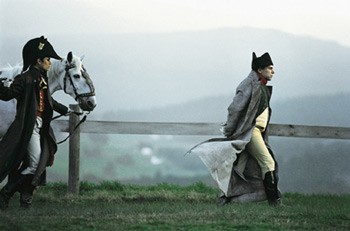A murder mystery based on a historical enigma: Napoleon’s Last Battle
1815. After the period of the Hundred Days which saw Napoleon's return to power, the fallen Emperor was taken prisoner by the British government from whom he had requested asylum, and sent to the island of St Helena, accompanied by a small entourage, some faithful allies and some with a vested interest. How could Napoleon, the victor of so many battles, the inspired political and military strategist, acquiesce to such an imprisonment in the middle of nowhere? What system of defence – therefore of attack – did he have in mind to escape the shackles of his jailers?
It was on St Helena, the (almost) unreachable island chosen by his enemies, that he would wage a mysterious battle, the last but the most important, the one that history had never revealed until now…
A finely-crafted work carrying a skilfully conducted plot shifting between light and darkness
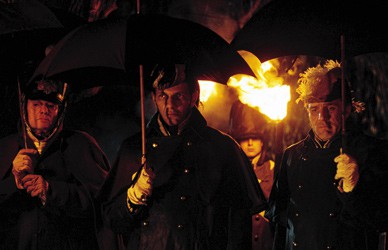 In the opening scene, it's night. Amid heavy rainfall, faces lit up by torches we witness the exhumation of Napoleon's coffin. From close-ups on the visibly-moved faces, the camera pans out and up revealing an overhead-view of Napoleon's coffin just at the moment the shroud is pulled back to uncover the body.
In the opening scene, it's night. Amid heavy rainfall, faces lit up by torches we witness the exhumation of Napoleon's coffin. From close-ups on the visibly-moved faces, the camera pans out and up revealing an overhead-view of Napoleon's coffin just at the moment the shroud is pulled back to uncover the body.
The film – like this first scene – is strong, full of emotion but with a lightness of touch, both from an aesthetic and human point of view.
The camerawork is quite classical (this is the only concession to the “historical” style; that being said, the fantastic is rarely appropriate for this sort of film) and the film is punctuated by a series of flashbacks. This classic device of suspense helps to distil details of the psychological complexity of the characters, which are never presented as caricatures.
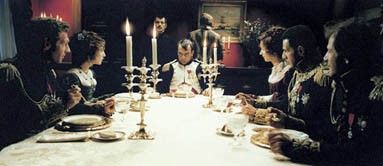 The first part of the film sets up the plot and introduces the characters and the complex relationships between them. Particular attention is paid to the details of the costumes (body movement) and the dialogues (fluidity of verbal exchanges). Whilst both the sense of oppression and boredom inherent in the lives of the exiles is truly palpable, this heaviness is psychological, rather than related to the historical subject. The dining scenes are indicative of an etiquette strained by sensibilities exacerbated by confinement; whilst the evenings spent reading and playing are punctuated by small phrases, revealing feelings that cannot be kept hidden: “Leave, to leave! That's the only word that comes out of your mouth! The island of Elba couldn't contain me, St Helena will not hold onto me either. We must be patient.”(Napoleon)
The first part of the film sets up the plot and introduces the characters and the complex relationships between them. Particular attention is paid to the details of the costumes (body movement) and the dialogues (fluidity of verbal exchanges). Whilst both the sense of oppression and boredom inherent in the lives of the exiles is truly palpable, this heaviness is psychological, rather than related to the historical subject. The dining scenes are indicative of an etiquette strained by sensibilities exacerbated by confinement; whilst the evenings spent reading and playing are punctuated by small phrases, revealing feelings that cannot be kept hidden: “Leave, to leave! That's the only word that comes out of your mouth! The island of Elba couldn't contain me, St Helena will not hold onto me either. We must be patient.”(Napoleon)
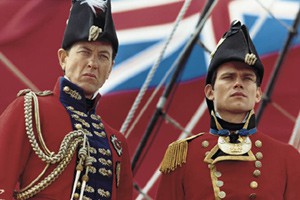 Then the pace accelerates: as Hudson Lowe enters the scene, the noose tightens around Napoleon's neck. The story is told from the “enemy” side by the young ordinance, Basil Heathcote, who is responsible for ensuring the presence of “General Bonaparte”, but who also has respectful admiration for the man who had dominated Europe and made England tremble. Here we see the confrontation between the jailer and his prisoner. An abortive attempt to escape has been thwarted, and a multitude of moral compromises are made in the daily life of the French exiles – there are departures and deaths… the various elements of mystery begin to emerge.
Then the pace accelerates: as Hudson Lowe enters the scene, the noose tightens around Napoleon's neck. The story is told from the “enemy” side by the young ordinance, Basil Heathcote, who is responsible for ensuring the presence of “General Bonaparte”, but who also has respectful admiration for the man who had dominated Europe and made England tremble. Here we see the confrontation between the jailer and his prisoner. An abortive attempt to escape has been thwarted, and a multitude of moral compromises are made in the daily life of the French exiles – there are departures and deaths… the various elements of mystery begin to emerge.
On the return of the Emperor's mortal remains to Paris, rumours run wild, Heathcote, who has in the meantime been promoted to the rank of officer, is leading the investigation, and tries to sort out fact from fiction, the plausible from the downright far-fetched, against a backdrop of passionate reactions and collective delusions.
Last but not least, Stephan Eicher's score pays homage to each image and to every scene, each one being enveloped in emotion, strength and romance.
A historically accurate thriller
This murder mystery is built around a specific historical event, around the issues arising from diverging testimonies. That said, the authors have avoided the trap of “the quest for historical truth”, with regard for what is, for some Napoleon enthusiasts, a sensitive subject.
The context and the historical facts are there; that being said, Ali never dressed as a Mamluk, and Las Cases is nowhere to be seen, but these are not the essential issues. The authors – but also the costume designer, the scriptwriter, and the actors – have managed to capture the “essence” of the period, its colour, its ‘music', and bring to life not just “historical” characters but also men and women. It is this balance that gives this film its modernity, but without that modernity ever being ‘in your face'. There have been other cinematic attempts – for the most part always less than successful – which have tried to cater to a 21st-Century audience, trivialising both the vocabulary the depiction of the relations between Napoleon and his entourage. That mistake has been avoided here.
Napoleon, opposite Monsieur N.
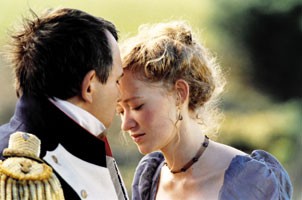 Napoleon. The role is so charged with myth that there has probably never been a role so intimidating to play. Everyone has “their” image of Napoleon.
Napoleon. The role is so charged with myth that there has probably never been a role so intimidating to play. Everyone has “their” image of Napoleon.
Torreton has a great deal of remarkable theatre experience, and it was this that saved him from the mannerisms that one might be tempted to use in order to act (or overact) such a character. Indeed, not once does Napoleon put his hand inside his waistcoat… Torreton presents us with a strategist, ruthlessly lucid about the people around him. Napoleon is confronted with a new space, not only a physical one (the island laws are indeed formidable …) but also a psychological one, Napoleon face-to-face with Monsieur N…
The fallen Emperor screws up his courage for his last battle (perhaps his most important?): to control his destiny right to the end, to resist when he feels destabilised by the spontaneous charm and loyal sentiments of Betsy Balcombe (played by the enticing Siobhán Hewlett). “The Emperor, he does not love you. You are spoiling his plans. It is not that passion that he intends to play out in his final act.” (Napoleon)
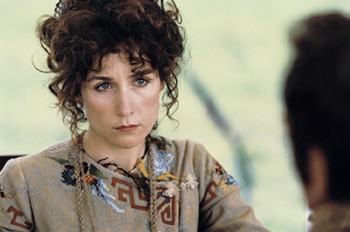 Facing Napoleon, there are two clans. His court, a mixture of loyalty and duplicity, and the “enemy” British clan, maintaining a constant surveillance, like a net that tightens around him a little more each day.
Facing Napoleon, there are two clans. His court, a mixture of loyalty and duplicity, and the “enemy” British clan, maintaining a constant surveillance, like a net that tightens around him a little more each day.
Elsa Zylberstein delivers a complex, frivolous and vigilant Albine de Montholon, who moves us via her attachment to Napoleon, an attachment complicated by her sense of her own interest. Stéphane Freiss portrays her husband, just as much an opportunist as she but with a weaker character. Frédéric Pierrot's Gourgaud, is a big-talking rogue right up to the end. As for the bodyguards of the Emperor, Roschdy Zem plays a sober and reliable Grand Marshal Bertrand, while Bruno Putzulu's Cipriani is direct and protective demonstrating his affection for the man who was once his childhood friend, “Stop that. Your vision of me is not what I am, Cipriani.”
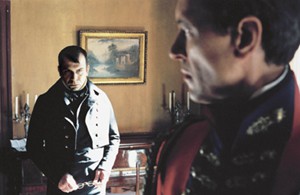 As for the two “English” characters, they put in a good performance. Richard E. Grant is superbly rigid and obsessive, wearing the clothes of his mission like a suit of armour, mission which he perhaps feels is his ultimate hour of glory as he tries to get over the reality of the failure of his military career?
As for the two “English” characters, they put in a good performance. Richard E. Grant is superbly rigid and obsessive, wearing the clothes of his mission like a suit of armour, mission which he perhaps feels is his ultimate hour of glory as he tries to get over the reality of the failure of his military career?
Jason Road plays the charming young officer, whose duty it was to follow the every move of the man who was – for his generation – a living legend. His complete and honest character drives him to uncover the reality of that historic event, namely, the death of Napoleon at St Helena: to understand it fully and not to seek at all costs to privilege one version over another.
Irène Delage, February 2003. (translation: Rebecca Young, Nov 2015)
 Monsieur N.
Monsieur N.
2003, 2h, colour, French (available on DVD with English subtitles)
Artistic and Technical staff
Director: Antoine de Caunes
Screenplay: René Manzor
Music: Stephan Eicher
Image: Pierre Aïm
Camera operator: Berto
Editing: Joëlle van Effenterre
Sound: Dominique Levert
Mixing: Didier Lozahic
Sets: Patrick Durand
Costume: Carine Sarfati
Production: Mention-Schaar M-C; P. Kubel
Cast
Napoleon: Philippe Torreton
Hudson Lowe: Richard E. Grant
Basil Heathcote: Jay Rodan
Albine de Montholon: Elsa Zilberstein
Maréchal Bertrand: Roschdy Zem
Cipriani: Bruno Putzulu
Général Montholon: Stéphane Freiss
Général Gourgaud: Frédéric Pierrot
Betsy Balcombe: Siobhán Hewlett
Thomas Reade: Peter Sullivan
Dr O'Meara: Stanley Townsend
Ali: Igor Skreblin
Fanny Bertrand: Blanche de Saint-Phalle


